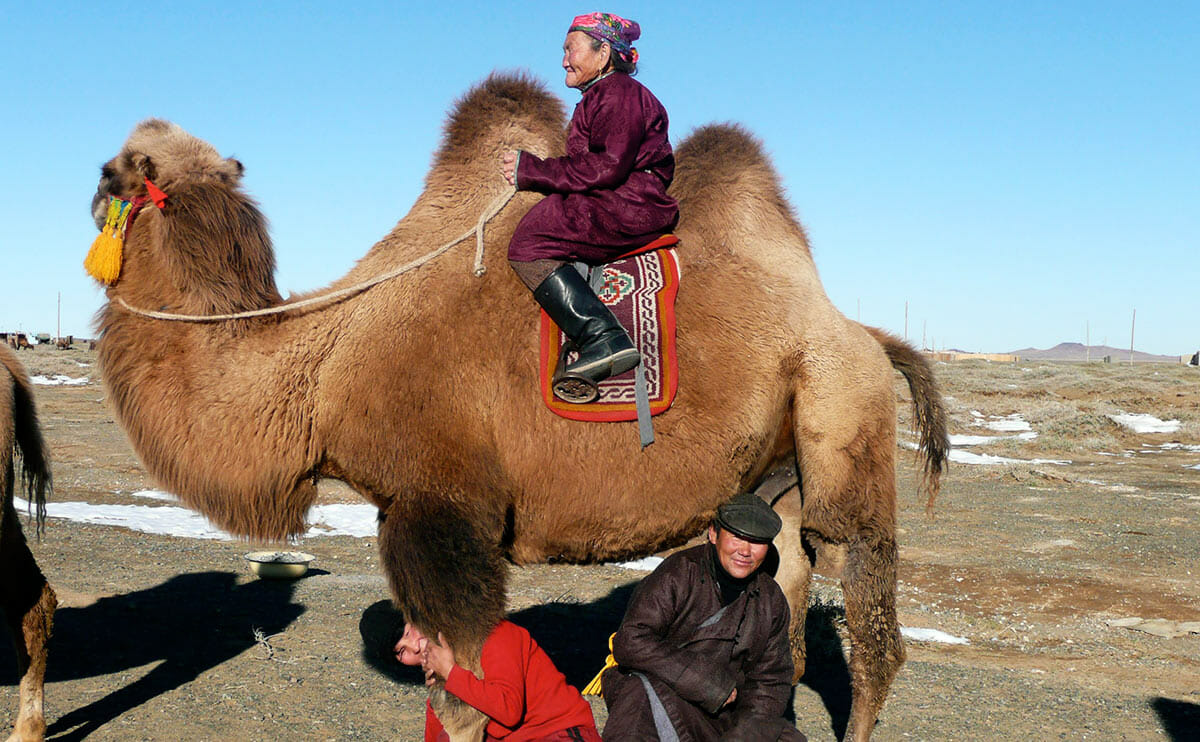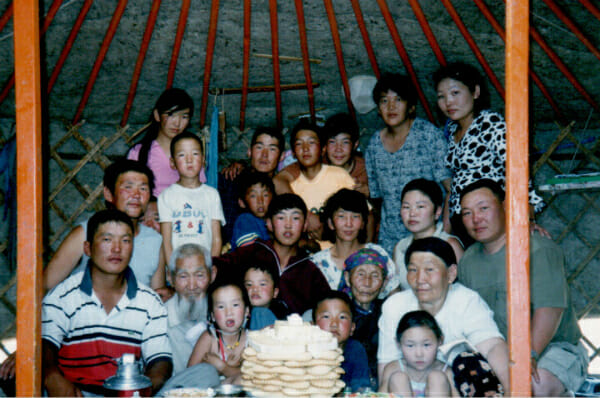Ask a Mongolian Camel Herder
We tracked down Badamsuren, a Mongolian camel herder in his mid-50s, to learn a bit more about his day-to-day life.
Ask a Mongolian Camel Herder
We tracked down Badamsuren, a Mongolian camel herder in his mid-50s, to learn a bit more about his day-to-day life.

It’s the tale of an adorable baby camel in Mongolia, completely shunned by his mother after a tough birth. For much of the movie, the baby stands by himself and wails. It breaks your heart.
The movie’s supporting stars are the herders, fretting about their fractured camel family. It’s very clear that if the camels aren’t happy, neither are the owners; the human-camel connection is intense. They end up traveling many miles through the desert, looking for a music teacher to perform a camel-healing ritual.
We wanted to know more about what it’s like to tend camels in the Gobi desert, one of the world’s most rugged, punishing landscapes. We tracked down Badamsuren (Mongols only go by one name), a Mongolian herder in his mid-50s, for a few questions. His responses have been translated into English.
Modern Farmer: Tell us a little about your life.
Badamsuren: I have four children; three of them live and work in Hanhongor. My wife is also a herder. We live in the town center during the winter but move our ger (a Mongolian yurt) to the countryside in the summer. I love to collect old buses and use the working ones to move my ger and family each summer.
MF: How long have you herded camel?
B: I have been herding camels for about 25 years, other animals for longer.
Badamsuren’s camels telling secrets.

Badamsuren’s extended family in a ger. He is on the far left, in a gray shirt.
Badamsuren and his wife Battsetseg with a just-born camel foal.
Milking the camel.
Battsetseg harvests camel dung.
MF: How many camels do you have?
B: About 45 camels of my own but I also herd other people’s camels. It is a common practice for people who are good at herding (and there is more skill involved than one might think) to herd other’s livestock for a cut of the profits. I, in turn, employ people to herd my animals at times when I am too busy.
MF: Describe a typical day.
B: I get up around 6 or 7 in the morning and work until 8 or 9 at night, depending on the season. Throughout the day I move the camels to different pasture areas, get them water (in the non-winter months), and check for injuries. Seasonal activities include castration, assisting with birthing, cutting off of wool, milking, inserting wooden sticks into noses for reins and butchering.
MF: Do the camels have very different personalities?
B: The camels range from difficult and temperamental to gentle and sweet. Sex of the camel doesn’t matter.
MF: Tell us about any poorly behaved camels. What do they do?
B: They don’t listen, they need correction, and in order to control them they often have to have wooden nose bits inserted.
MF: What is the hardest part of your job?
B: The hardest part of the job is in the summer. Since I herd in an area without open water, I must hand-pump water everyday for the herd. Each camel needs about 50 liters of water so that is at least 2250 liters of water (over 560 gallons of water) hand-pumped everyday.
MF: What is the best part of your job?
B: I love being outdoors and working with my family. And of course, spending time with the animals.
MF: Did you see the weeping camel movie? What did you think of it?
B: I thought it was very nice and true to life. My oldest son is one of the kids playing the morin khuur in the school when they go to find the music teacher.
MF: What are the different products you get from the camels?
B: From my camels we get wool which is used for clothing and rope, milk or hormag which is a popular summer time drink, often drunk warm with sugar. We also get other dairy products such as soft and hard cheeses and meat.
MF: If you weren’t herding camels, what job would you like?
B: I would still want to work with animals. My dream is to get some small-business funding to increase my herd and offer services such as trekking tourists around. A few years back I worked with a German group to make a book about a camel trek from the Gobi desert to Central Mongolia. I would like to do more like that, and always increase my own knowledge about camels.
Also, I am one of the four local government representatives for herders in the county.
[pl_video type=”vimeo” id=”65000387″]
Follow us
This work is licensed under a Creative Commons Attribution-NoDerivatives 4.0 International License.
Want to republish a Modern Farmer story?
We are happy for Modern Farmer stories to be shared, and encourage you to republish our articles for your audience. When doing so, we ask that you follow these guidelines:
Please credit us and our writers
For the author byline, please use “Author Name, Modern Farmer.” At the top of our stories, if on the web, please include this text and link: “This story was originally published by Modern Farmer.”
Please make sure to include a link back to either our home page or the article URL.
At the bottom of the story, please include the following text:
“Modern Farmer is a nonprofit initiative dedicated to raising awareness and catalyzing action at the intersection of food, agriculture, and society. Read more at <link>Modern Farmer</link>.”
Use our widget
We’d like to be able to track our stories, so we ask that if you republish our content, you do so using our widget (located on the left hand side of the article). The HTML code has a built-in tracker that tells us the data and domain where the story was published, as well as view counts.
Check the image requirements
It’s your responsibility to confirm you're licensed to republish images in our articles. Some images, such as those from commercial providers, don't allow their images to be republished without permission or payment. Copyright terms are generally listed in the image caption and attribution. You are welcome to omit our images or substitute with your own. Charts and interactive graphics follow the same rules.
Don’t change too much. Or, ask us first.
Articles must be republished in their entirety. It’s okay to change references to time (“today” to “yesterday”) or location (“Iowa City, IA” to “here”). But please keep everything else the same.
If you feel strongly that a more material edit needs to be made, get in touch with us at [email protected]. We’re happy to discuss it with the original author, but we must have prior approval for changes before publication.
Special cases
Extracts. You may run the first few lines or paragraphs of the article and then say: “Read the full article at Modern Farmer” with a link back to the original article.
Quotes. You may quote authors provided you include a link back to the article URL.
Translations. These require writer approval. To inquire about translation of a Modern Farmer article, contact us at [email protected]
Signed consent / copyright release forms. These are not required, provided you are following these guidelines.
Print. Articles can be republished in print under these same rules, with the exception that you do not need to include the links.
Tag us
When sharing the story on social media, please tag us using the following: - Twitter (@ModFarm) - Facebook (@ModernFarmerMedia) - Instagram (@modfarm)
Use our content respectfully
Modern Farmer is a nonprofit and as such we share our content for free and in good faith in order to reach new audiences. Respectfully,
No selling ads against our stories. It’s okay to put our stories on pages with ads.
Don’t republish our material wholesale, or automatically; you need to select stories to be republished individually.
You have no rights to sell, license, syndicate, or otherwise represent yourself as the authorized owner of our material to any third parties. This means that you cannot actively publish or submit our work for syndication to third party platforms or apps like Apple News or Google News. We understand that publishers cannot fully control when certain third parties automatically summarize or crawl content from publishers’ own sites.
Keep in touch
We want to hear from you if you love Modern Farmer content, have a collaboration idea, or anything else to share. As a nonprofit outlet, we work in service of our community and are always open to comments, feedback, and ideas. Contact us at [email protected].by Jesse Hirsch, Modern Farmer
July 31, 2013
Modern Farmer Weekly
Solutions Hub
Innovations, ideas and inspiration. Actionable solutions for a resilient food system.
ExploreExplore other topics
Share With Us
We want to hear from Modern Farmer readers who have thoughtful commentary, actionable solutions, or helpful ideas to share.
SubmitNecessary cookies are absolutely essential for the website to function properly. This category only includes cookies that ensures basic functionalities and security features of the website. These cookies do not store any personal information.
Any cookies that may not be particularly necessary for the website to function and are used specifically to collect user personal data via analytics, ads, other embedded contents are termed as non-necessary cookies.